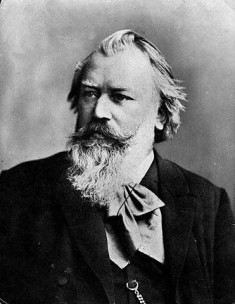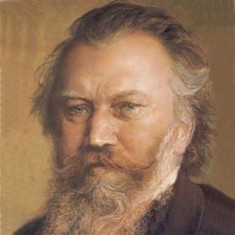| Johannes Brahms | |
|---|---|
 |
|
| Composer | |
| Specialty | Piano, chamber ensembles, symphony, voice, chorus |
| Born | May 7, 1833 |
| Died | Apr. 3, 1897 |
| Nationality | German |
Johannes Brahms was a German pianist and composer. He spent most of his professional life in Vienna, Austria, where he led a musical scene. He composed for chamber ensembles, piano, symphony orchestra and for chorus and voice. He premiered several of his works and he even worked closely with some great musicians of his time, including Clara Schumann, who was also a pianist.
Early Years
Johannes is considered one of the 19th century’s great composers and a leading musician of the Romantic era. He was born on May 7, 1833, in Hamburg, Germany. Music was introduced to his life when he was still young. He started playing guitar at the age of seven and by the time he was a teenager, he was already a good musician.
He utilized his talents to make a living by playing in brothels, local inns, and at the city’s docks. He was introduced to German composer and music critic, Robert Schumann, in 1853. They became great friends and Schumann even praised Brahms s being a genius.
Greatest Achievements
Brahms made a visit to Vienna for the first time in the early 1860s and in 1863, he was named as a director of Singakadenie, which was a choral group. In this group, he concentrated on modern and historical a cappella works. By the early 1870s, Brahms was the principle conductor of the Society of the Friends of Music.
In addition, he directed the Vienna Philharmonic Orchestra for three seasons. Following the death of his mother in 1868, he completed a German Requiem, which was a composition that was based on Biblical texts and it is often seen as the most vital pieces of choral music to be created in the 19th century.
The multifaceted pieces bring together some mixed chorus, a complete orchestra, and solo voices. Brahms’ contributions covered some light ground as well. His compositions from this very period included two volumes of Hungarian Dances and waltzes for piano duet.
Personal Life
Johannes Brahms never married. He had a string of relationships after he failed to marry the wife of a friend, Clara Schumann. He had an affair in 1858 with Agathe Von Siebold and for unknown reasons, withdrew from it. It is not understood if Brahms fell in love but in one instance, he denied a woman some piano lessons because he was attracted to her.
Later Career
 Brahms remained in Vienna all his life. He travelled a lot in Europe especially during summer doing concerts. During the performances, he performed solely his own material. His work included Violin Sonata in D Minor, Bouble Concerto in A minor, and Piano Trio No. 3. Furthermore, he completed String Quintet in F major and also String Quintet in G Major.
Brahms remained in Vienna all his life. He travelled a lot in Europe especially during summer doing concerts. During the performances, he performed solely his own material. His work included Violin Sonata in D Minor, Bouble Concerto in A minor, and Piano Trio No. 3. Furthermore, he completed String Quintet in F major and also String Quintet in G Major.
In the final decade of his life, he wrote a number of chamber music pieces and he also teamed up with Richard Muhfeld for some songs for the cello and piano, Clarinet Trio, and Clarinet Quintet.
His commitment to his craft actually showed that he was a great perfectionist even though some people considered him as an innovator and a traditionalist. Brahm destroyed some of his finished pieces that he saw to be not good enough, including 20 string quartets.
In 1890, Brahams said that he was giving up composing, but before he knew it, he was back at it again. In his last year, he finished Vier Ernste Gesande, which drew on the work from the Hebrew Bible and the New Testament. This was a very revealing peace for Brahms which he damned what was found on this earth and embraced death as a relief from this material world that has a lot of pain as well as suffering.
Death and Legacy
Jonannes Brahm constantly had death on his mind during his last years. In May of 1896, his good friend died after years of suffering from illnesses. At around this period, Brahms’ own health started deteriorating. His doctors discovered that he had a liver problem.
He gave his last and stunning performance in March of 1897 and died one month later on April 3, 1897. It was later found that his death was caused by cancer. At the time of his death, he was 63 years. He was buried in Zentralfriedhof, Vienna.